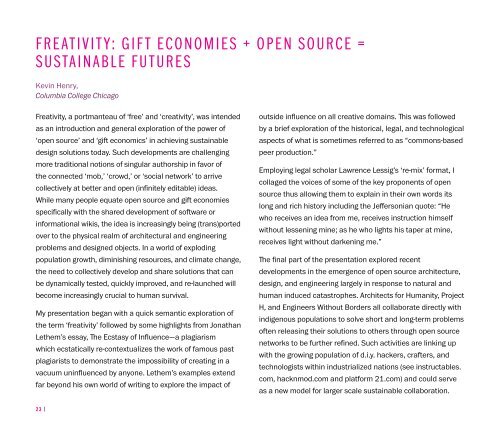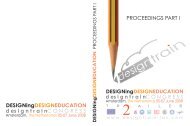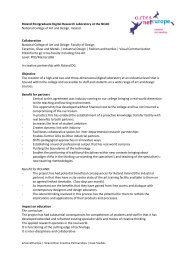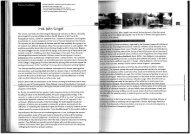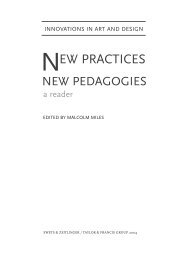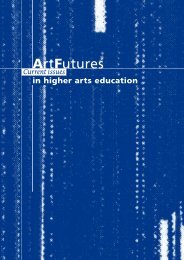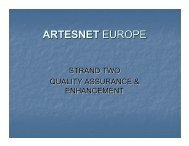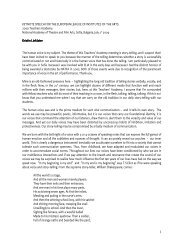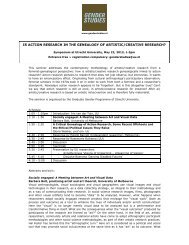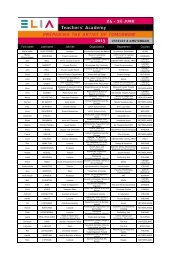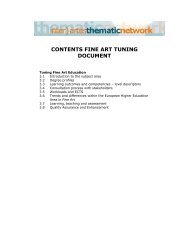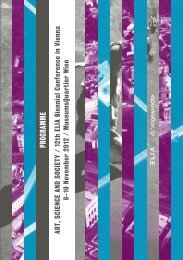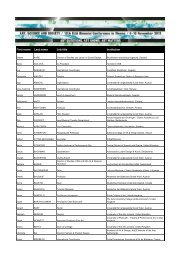claiming creativity - Elia
claiming creativity - Elia
claiming creativity - Elia
You also want an ePaper? Increase the reach of your titles
YUMPU automatically turns print PDFs into web optimized ePapers that Google loves.
Freativity: Gift Economies + Open Source =<br />
Sustainable Futures<br />
Kevin Henry,<br />
Columbia College Chicago<br />
Freativity, a portmanteau of ‘free’ and ‘<strong>creativity</strong>’, was intended<br />
as an introduction and general exploration of the power of<br />
‘open source’ and ‘gift economics’ in achieving sustainable<br />
design solutions today. Such developments are challenging<br />
more traditional notions of singular authorship in favor of<br />
the connected ‘mob,’ ‘crowd,’ or ‘social network’ to arrive<br />
collectively at better and open (infinitely editable) ideas.<br />
While many people equate open source and gift economies<br />
specifically with the shared development of software or<br />
informational wikis, the idea is increasingly being (trans)ported<br />
over to the physical realm of architectural and engineering<br />
problems and designed objects. In a world of exploding<br />
population growth, diminishing resources, and climate change,<br />
the need to collectively develop and share solutions that can<br />
be dynamically tested, quickly improved, and re-launched will<br />
become increasingly crucial to human survival.<br />
My presentation began with a quick semantic exploration of<br />
the term ‘freativity’ followed by some highlights from Jonathan<br />
Lethem’s essay, The Ecstasy of Influence—a plagiarism<br />
which ecstatically re-contextualizes the work of famous past<br />
plagiarists to demonstrate the impossibility of creating in a<br />
vacuum uninfluenced by anyone. Lethem’s examples extend<br />
far beyond his own world of writing to explore the impact of<br />
outside influence on all creative domains. This was followed<br />
by a brief exploration of the historical, legal, and technological<br />
aspects of what is sometimes referred to as “commons-based<br />
peer production.”<br />
Employing legal scholar Lawrence Lessig’s ‘re-mix’ format, I<br />
collaged the voices of some of the key proponents of open<br />
source thus allowing them to explain in their own words its<br />
long and rich history including the Jeffersonian quote: “He<br />
who receives an idea from me, receives instruction himself<br />
without lessening mine; as he who lights his taper at mine,<br />
receives light without darkening me.”<br />
The final part of the presentation explored recent<br />
developments in the emergence of open source architecture,<br />
design, and engineering largely in response to natural and<br />
human induced catastrophes. Architects for Humanity, Project<br />
H, and Engineers Without Borders all collaborate directly with<br />
indigenous populations to solve short and long-term problems<br />
often releasing their solutions to others through open source<br />
networks to be further refined. Such activities are linking up<br />
with the growing population of d.i.y. hackers, crafters, and<br />
technologists within industrialized nations (see instructables.<br />
com, hacknmod.com and platform 21.com) and could serve<br />
as a new model for larger scale sustainable collaboration.<br />
23 |<br />
| 24


